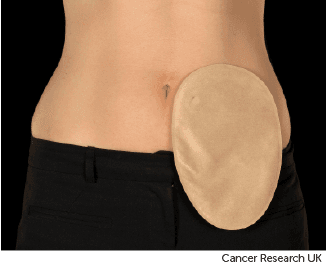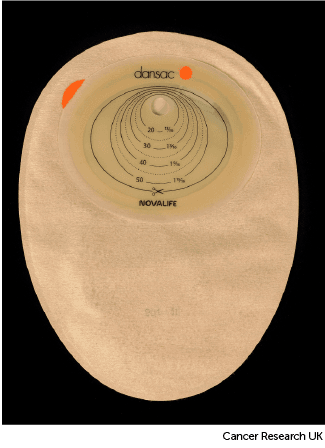Types of bowel problems
A colostomy is an operation where the large bowel (colon) is brought onto the surface of the abdomen to create an opening. The opening is also known as a stoma.
You wear a colostomy bag that sticks onto the skin over the stoma to collect your poo. You wear a bag because you can’t control when the stoma will work. It doesn’t work in the same way as your back passage.

Some people with bowel cancer need to have a colostomy after their surgery. It may be permanent or temporary. Most of these will be temporary. If you have a temporary stoma your surgeon will tell you when you are likely to have the reversal operation.
People having surgery for vaginal, cervical or womb cancer that has spread to surrounding tissue, may need to have a big operation called a pelvic exenteration. This operation involves having a permanent colostomy.
Find out more about a pelvic exenteration operation in the cervical cancer section
There might be other situations with other types of cancers where you need to have a colostomy. But it is not common.
These photographs show one type of colostomy bag from the front and back. This photograph is what the colostomy bag looks like in place over the stoma.

This photograph shows the back of the colostomy bag.

We have more information about having a colostomy for anal, colon and rectal cancer. The information can be found under in the treatment section under surgery of the cancer type.
Go to your cancer type to find out more
An ileostomy is an operation where the small bowel (ileum) is brought onto the surface of the abdomen to create an opening.
When you have an ileostomy your poo comes out through the stoma. It is collected in a bag that sticks over the stoma. The poo is usually looser rather than solid. It’s like the consistency of toothpaste or wallpaper paste.

You might have a temporary ileostomy with surgery to remove part of the colon. This is to give your colon time to rest and heal after surgery. It is also to get you ready for any further cancer treatment if you need it. In another operation, your surgeon joins the ends of the bowel back together. This is called a stoma reversal. Your surgeon will tell you when you are likely to have this operation.
You might need a permanent ileostomy if your surgeon needs to remove a large part of your colon and can’t join the remaining ends of colon together. Your surgeon will avoid this if at all possible.
Find out about having an ileostomy for colon cancer
Stoma nurses are experienced in looking after stomas (ileostomies and colostomies) and teaching you how to look after them. A specialist stoma nurse will visit you on the ward to help you and show you what to do.
You usually see the stoma nurse on the lead up to your operation. This means they can talk things through with you and offer advice and support.
The stoma nurse will also see you on the day of the operation. They use a pen to mark where a stoma might be created. For the first few days after your operation, they will help you look after and clean the stoma, and change the bags. They will also help you to find which type of stoma bag is the best for you.
Your stoma nurse will give you some stoma bags to take home. You get more from the chemist, local stockist or delivery service. Supplies are free, but you need a prescription from your GP.
Learning to look after a stoma takes time and it can be worrying at first. But you won't be expected to cope on your own. You will find that it gets easier with time and you will also have the support from your stoma nurse.
It is helpful to keep everything you need to change your stoma bag together in one place. That way, you won't be half way through and realise that something vital is missing.
Read about coping with a stoma
Talk to your stoma nurse or ward nurses about the kind of support you will need at home. Before you leave hospital, you might want the stoma nurse to show your relatives how to look after the colostomy or ileostomy. They can help out when you get home.
Your stoma nurse will give you a contact number before you leave the hospital. You can ring them for advice and support, and the nurse may arrange to visit you at home.
There are organisations to help you cope with having a colostomy or ileostomy. They can offer practical advice and support.
There are also handcrafted ostomy covers available. These come in different shapes and sizes and are made of a wide range of fabrics. Cancer Research UK is unable to list all the different companies that make these handcrafted covers. However, if you search the internet you can find different options available.
Last reviewed: 30 Sept 2025
Next review due: 30 Sept 2028
You might have a colostomy or ileostomy after surgery for bowel cancer. The end of your bowel is brought out into an opening on your tummy. The opening is called a stoma or ostomy.
How cancer or it's treatments can affect the bowel.
Doctors or nurses may ask you to describe your bowel habits and what your poo (stool) looks like. The pictures on this page can help you do this.
Search for the cancer type you want to find out about. Each section has detailed information about symptoms, diagnosis, treatment, research and coping with cancer.
On average people pass wind about 15 to 25 times a day. But sometimes illness, what you eat, and stress can increase the amount of wind you pass.

About Cancer generously supported by Dangoor Education since 2010. Learn more about Dangoor Education
Search our clinical trials database for all cancer trials and studies recruiting in the UK.
Connect with other people affected by cancer and share your experiences.
Questions about cancer? Call freephone 0808 800 40 40 from 9 to 5 - Monday to Friday. Alternatively, you can email us.